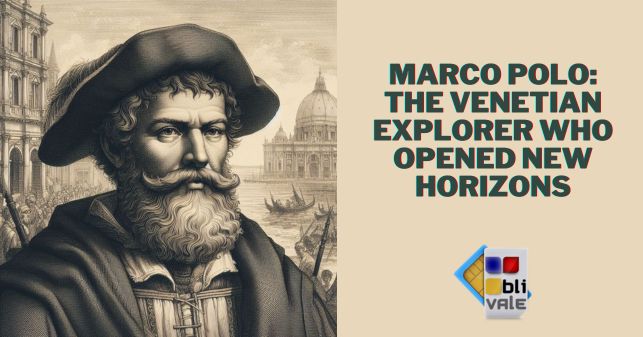Marco Polo, the famous Venetian merchant, is known throughout the world for his legendary travels in Asia and for his book "Il Milione". Born in 1254 in Venice to a family of merchants, Marco Polo left an indelible mark on Western history and culture. In this article we will explore the life, exploits and legacy of this extraordinary explorer who opened new paths between East and West.
Birth and death
Marco Polo was born in Venice in 1254, the son of a family of wealthy merchants. His hometown was the starting point for his epic adventures in distant lands. Marco Polo died in Venice on January 9, 1324, leaving behind a legacy that would influence future generations of explorers and traders.
The legendary journeys
At the age of just 17, Marco Polo embarked on a journey that would change his life and the course of history. Together with his father Niccolò and his uncle Matteo, he undertook a long journey that lasted 24 years. Traveling through the Mongol Empire, they arrived at the court of the Great Khan Kublai Khan, where Marco Polo would soon gain fame and fortune.
Businesses at the service of the Great Khan
Marco Polo spent 17 years in the service of the Great Khan, covering important roles that allowed him to explore vast territories of Asia. During this period, he had the opportunity to document his experiences and observations in what would become one of the most famous books in history: "Il Milione".
The fame of Marco Polo
"Il Milione" quickly became a bestseller in Europe, offering Westerners an unprecedented glimpse into the Orient. The detailed descriptions of geography, culture, customs and riches of remote lands such as China, India and Japan aroused great interest and curiosity among European readers.
Marco Polo's legacy
In addition to spreading knowledge of spices, silk, jewelry, and other exotic goods to Europe, Marco Polo contributed significantly to the growth of trade between East and West. His detailed descriptions of Eastern cities and peoples stimulated interest in new trade routes and further exploration in Asia.
The lasting impact of Marco Polo
Marco Polo not only opened new avenues for European exploration of Asia, but also stimulated trade between the two continents. The new geographical, scientific and cultural knowledge introduced by Marco Polo profoundly influenced medieval and Renaissance Europe, leaving an indelible mark on Western literature and art.
The other aspects of Marco Polo's life
In addition to his exploits as an explorer and successful author, Marco Polo was also a skilled merchant who amassed a considerable fortune during his lifetime. He was captured by the Genoese during a naval battle and spent three years in prison before returning to Venice, where he married Donata Badoer and had three daughters.
Celebrate the genius of Marco Polo
Today, Marco Polo is celebrated around the world for his courage, curiosity and pioneering spirit which helped change the view of the Western world. His impact on history and culture remains tangible today, making his name synonymous with adventure and discovery.
Conclusion
In conclusion, Marco Polo was one of the greatest explorers of all time, whose epic journey and book left an indelible mark on Western history and culture. His legacy continues to inspire new generations of travelers and history buffs, proving that the desire to explore and discover new worlds is an eternal impulse of humanity.









